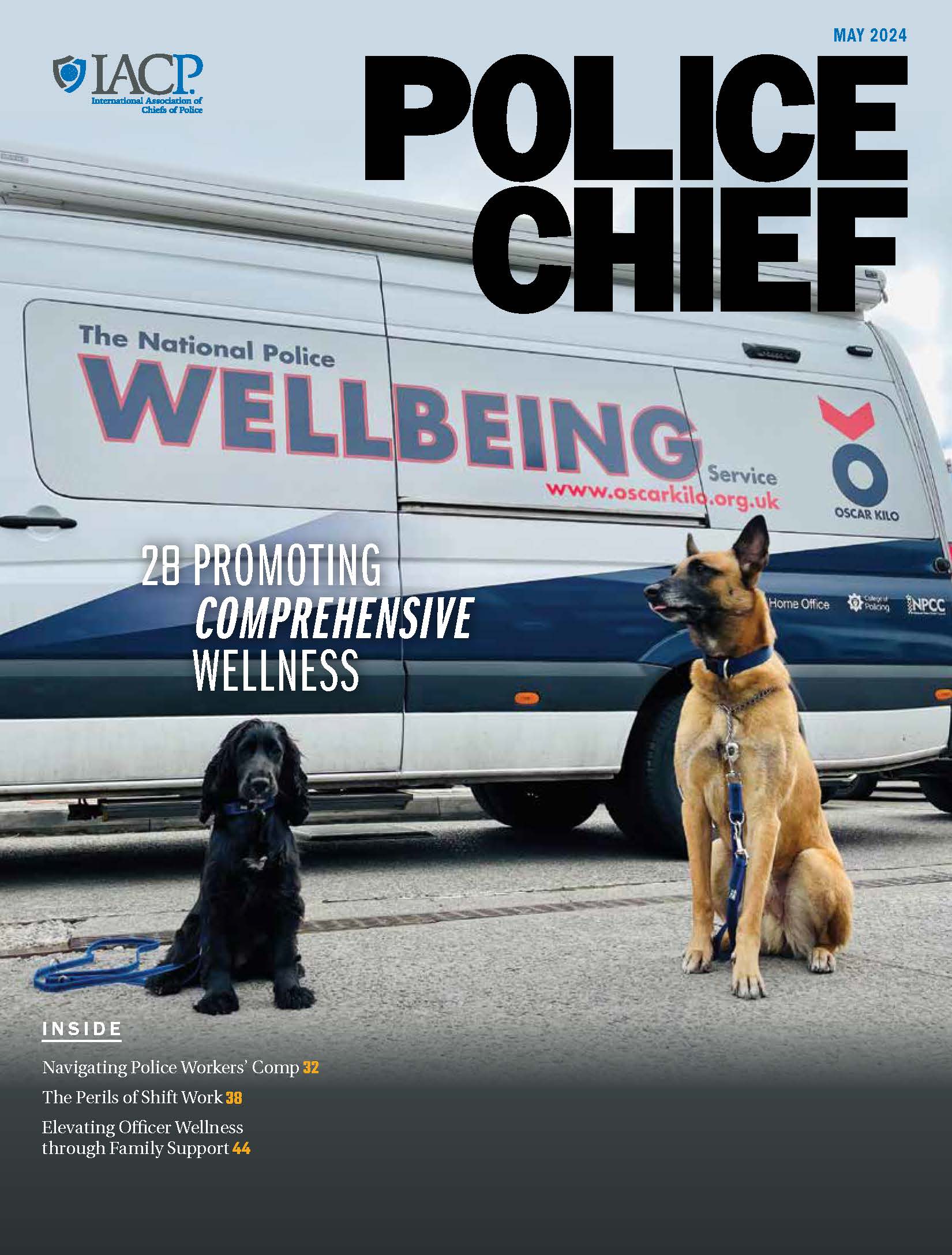Given the stunning rise of mental health crises among police officers, including but not limited to higher levels of officer depression, substance use, and even suicide, it’s clear that the responsibilities of police leaders have moved far beyond community safety.1 Despite a long-standing emphasis on officer safety in leadership training, an integral aspect has been overlooked: officer trauma and mental health.
 In a 2018 University of Phoenix survey involving 2,000 police officers and other first responders, 85 percent of respondents reported experiencing symptoms of mental health conditions. Additionally, 84 percent of the first responders surveyed had encountered a traumatic experience on the job, and 34 percent had received a diagnosis of a mental health condition such as depression or post-traumatic stress disorder.2 The Centers for Disease Control and Prevention also released data that associate occupational stress for police and other first responders with serious mental health issues, including hopelessness and suicidal behaviors.3
In a 2018 University of Phoenix survey involving 2,000 police officers and other first responders, 85 percent of respondents reported experiencing symptoms of mental health conditions. Additionally, 84 percent of the first responders surveyed had encountered a traumatic experience on the job, and 34 percent had received a diagnosis of a mental health condition such as depression or post-traumatic stress disorder.2 The Centers for Disease Control and Prevention also released data that associate occupational stress for police and other first responders with serious mental health issues, including hopelessness and suicidal behaviors.3
Police officers not only regularly handle mental health crises and address addiction issues impacting their communities but also grapple with inadequate resources for processing their own mental health traumas, with dangerous or even deadly outcomes. In fact, research indicates police officers are more likely to die from suicide than on a call.4 A 2021 report from the Council on Criminal Justice Task Force on Policing revealed that merely 29 percent of police departments offered wellness programs or comprehensive mental health training.5 This shortage perpetuates the stigma surrounding officers seeking the mental health support that research proves is necessary.
Today, forward-thinking leaders in policing have a chance to dismantle the stigma about mental health and promote open discussions about self-care. As outlined herein, it is a police chief’s responsibility to advocate for officer self-care, identify potential signs of mental health challenges among officers, and propose effective strategies for ongoing conversations and officer support.
Uncovering the Mental Health Stigma in Policing
When it comes to policing and the origins of mental health stigma, there is a societal perception that police officers, given their role in addressing community issues, should be fully equipped to handle their own problems as well.
 However, police leaders are aware that officers undergo unique training that may shape their worldview differently than other first responders. Officers are tasked with adopting a response-based perspective focused on possibility rather than probability. Unlike anticipating events with a mindset of “that probably won’t happen,” officers are trained to remain watchful, recognizing the potential for any occurrence. This mindset, known as hypervigilance, deprioritizes emotions and triggers the release of cortisol and adrenaline in the human body, activating its “fight or flight” protective response.
However, police leaders are aware that officers undergo unique training that may shape their worldview differently than other first responders. Officers are tasked with adopting a response-based perspective focused on possibility rather than probability. Unlike anticipating events with a mindset of “that probably won’t happen,” officers are trained to remain watchful, recognizing the potential for any occurrence. This mindset, known as hypervigilance, deprioritizes emotions and triggers the release of cortisol and adrenaline in the human body, activating its “fight or flight” protective response.
Police officers typically lack adequate training to process their protective responses or emotions. This deficiency, coupled with their role as community problem-solvers, may contribute to their inability to “switch it off” at home. It may also make them reluctant to seek assistance from leadership, being apprehensive that it could influence perceptions of their professional capabilities. For example, in the previously mentioned 2018 University of Phoenix respondent survey, 47 percent of first responders feared that they would face negative repercussions if they asked for help with mental health issues on the job, fearing differential treatment from supervisors, perception of weakness by coworkers, and apprehension about potential career setbacks such as being passed over for promotions.6
For Leaders, Addressing Mental Health Matters
Having the self-management tools and ability to process emotions is crucial for dealing with the frequency of trauma exposure among police officers and first responders. While the average person encounters two to three critical incidents in their life, police officers can be exposed to two to five per month, totaling an average of 178 critical incidents throughout their career.7
Fortunately, police leaders are now more aware of the types of ongoing conversations that are needed to support police officers’ and first responders’ mental health. The objective of these discussions is to foster acceptance and implement proactive measures that counteract the stigma around mental health. Collectively, police leaders must recognize that changing one’s belief system during a crisis is not feasible, and officers cannot be expected to respond differently in a crisis without proper training and preparation.
Fostering a Culture of Self-Care
In cultivating a culture of self-care, police leaders need to openly recognize that their personal belief systems, unresolved mental health traumas, and lived experiences differ from their peers and subordinates. After all, what triggers one officer on a call may not affect another. Even if leaders don’t always comprehend the reasons behind certain officer reactions, they must still acknowledge, respect, and prioritize these factors in their awareness.
7 Best Practices for Implementing Change
The following best practices for police leaders are recommended for consideration as they establish robust mental health support for their officers and challenge the stigma about mental health treatment in policing:
1. Exercise non-judgment: Developing a nonjudgmental culture within a police department requires a deep understanding that the impact of traumatic experiences among officers varies. A strong and empathetic police chief acknowledges that traumatic experiences are not universal. One way to honor lived experiences is by offering officers ways to safely articulate unique areas of trauma, such as instances of domestic abuse or calls involving the elderly. This provides leaders with a more comprehensive and considerate understanding of those on duty, demonstrating a commitment to all traumatic events, allowing for personalized support opportunities, and facilitating a more inclusive work environment.
2. Foster empathetic accountability: Promoting compassionate accountability and taking an unbiased approach helps ensure everyone actively recognizes and honors the varied lived experiences of every officer. Individuals should feel empowered to voice their honest concerns and challenge situations where fellow officers fail to respect or offer sufficient support. Noncompliant, undesirable, or risky behaviors by an officer can also be a sign of unwellness and should be properly investigated. By incorporating multitiered systems such as internal reviews and investigations, as well as ingraining non-judgment in the department’s culture, one creates a workplace that values accountability and responsiveness to the needs of all department members. Additionally, it contributes to a more supportive atmosphere, ultimately strengthening the overall effectiveness and communication of the department’s leadership.
3. Set an example: Leading by example is a cornerstone principle for police leaders committed to shaping a supportive and understanding department atmosphere. By acknowledging and sharing their own mental health struggles, leaders communicate a powerful message and reinforce that no one is alone in facing personal challenges. A 2019 first responder study found that individuals in crisis were 71 percent more likely to seek assistance if leaders discussed their mental health journeys.8 Therefore, a leader’s willingness to share not only breaks down stigmas and normalizes mental health discussions but also inspires a collective commitment to the well-being of the entire police force.
4. Create a roadmap for the mental health policy: Crafting a robust mental health policy is pivotal for police agencies that are committed to officer well-being. It involves developing comprehensive guidelines tailored to manage officers in crisis, including a structured roadmap outlining clear steps and actions. Integrating peer support mechanisms and ensuring access to readily available resources—whether through internal or third-party contact numbers—helps provide immediate assistance. As a starting point, the U.S. Department of Justice’s website includes mindfulness strategies, crisis hotline numbers, and suggestions to improve police department mental health.

Also, once a policy is implemented, police leaders should create feedback loops that regularly evaluate how effective their wellness program is in recognizing those who need help and how trustworthy their resources are considered by their members. This can be accomplished through anonymous surveys and metrics that depict how many people are actively engaged in the wellness service. Overall, well-defined policies that continuously prioritize officer mental health help nurture the department’s confidence and offer a tangible approach to addressing any mental health challenges.
5. Embrace peer support: Police agencies must actively recognize and leverage the profound impact of peer support programming on officers’ mental well-being. Establishing a framework encouraging officers to share experiences through formal mentoring programs or informal workplace connections creates a collective supportive network. Moreover, an environment encouraging peer connections significantly aids in officer suicide prevention and increases the likelihood of officers sharing their own struggles during future difficult circumstances.9
6. Integrate community: When formulating and implementing mental health policies, a comprehensive leadership perspective is crucial, extending beyond the department to include the broader population of first responders and community members. Addressing unique challenges faced by dispatchers and integrating community mental health considerations ensures the well-being of officers and bring about confidence among police personnel when dealing with individuals in distress.
7. Resolve the fear of asking for help and explain PTSD vs. PTSI: Mitigating the fear associated with seeking help for mental health challenges involves overcoming the stigma that officers who do so are weak. Challenging stereotypes creates an environment where officers feel comfortable and empowered to share their distress without fear of judgment. Additionally, distinguishing between PTSD and PTSI, by leading with the term “injury” instead of “disorder,” emphasizes that trauma was inflicted in the line of duty. This PTSI language change contributes to the realization that seeking help is a proactive step toward healing and recovery, promoting overall mental health resilience within the police community.
Identifying Potential Indicators of Officers in Mental Health Distress
The signs of mental health struggles can manifest differently in each officer. However, literature suggests that substantial changes in appearance and behavior serve as crucial signals that an officer may be contending with mental health issues. This could look like withdrawal from social interactions with friends and colleagues, poor concentration or memory, increased alcohol consumption, headaches, irritability, or loss of appetite.
In any leadership role, it’s imperative to maintain vigilance and promptly respond to these observable changes. This proactive approach cultivates a supportive environment that prioritizes the well-being of all team members.
Finding the Right Mental Health Resources

Nearly half of U.S. police departments comprise 10 or fewer police officers.10 This scarcity often translates to limited internal mental health resources; however, specialized mental health centers are available that specifically cater to the needs of police officers and military veterans, providing comprehensive treatment for distress beyond drugs and alcohol addiction. Online resources may also be an option—one example is, www.Helping1stResponders.com, where the authors serve as senior public safety liaisons to help connect employees, agencies, and family members within the first responder community with culturally competent resources at every level of the behavioral health and substance use care system.
Knowing the Impacts and Benefits of Stigma Reduction
By actively confronting the stigma and establishing comprehensive mental health support, police leaders create a crucial space for officers to authentically engage with their humanity and exercise greater control over their responses rather than reacting to triggers and unresolved personal mental health trauma. Additionally, adequate mental health support, such as those that align with the previously listed seven best practices, helps officers adopt healthy coping mechanisms, including self-awareness and self-management, that are integral to balancing their on-call and personal lives. Overall, this beneficial space equips officers and first responders to offer heightened care to themselves, their family members, those in crisis, and the wider community.
Conclusion
Access to mental health resources has become a nonnegotiable necessity for officers and first responders. However, by developing policies and having candid mental health conversations in their departments, police leaders can help ensure that officers are equipped to cope with the frequency of trauma that lies within their role and lived experiences.
Notes:
1Cady Stanton “Police, Firefighters Die by Suicide More Often Than in Line of Duty. Why Rates Remain High,” USA Today, June 10, 2022.
2University of Phoenix, “University of Phoenix Survey Finds 93 Percent of First Responders Say Mental Health Is as Important as Physical Health,” press release, September 11, 2018.
3Rodney Luster, “First Responders and Mental Health: When Heroes Need Rescuing,” Psychiatric Times, September 9, 2022.
4Christal Hayes, “‘Silence Can Be Deadly’: 46 Officers Were Fatally Shot Last Year. More Than Triple That — 140 — Committed Suicide,” USA TODAY, April 11, 2018.
5Penelope Allison et al., “Police Stress and Depressive Symptoms: Role of Coping and Hardiness,” Policing: An International Journal 43, no. 2 (2020): 247–261.
6University of Phoenix, “University of Phoenix Survey Finds 93 Percent of First Responders Say Mental Health Is as Important as Physical Health.”
7Saul Jaeger, “The Impact of Life Experiences on Police Officers,” Perspective, Law Enforcement Bulletin, July 11, 2023.
8University of Phoenix, “University of Phoenix Survey Finds More Than Half of First Responders Feel There Are Job Repercussions for Seeking Professional Mental Health Counseling,” PR Newswire, September 11, 2019.
9National Consortium on Preventing Law Enforcement Suicide, Peer Support as a Powerful Tool in Law Enforcement Suicide Prevention, IACP, 2021; University of Phoenix, “University of Phoenix Survey Finds More Than Half of First Responders Feel There Are Job Repercussions For Seeking Professional Mental Health Counseling.”
10Mark Berman, “Most Police Departments in America Are Small. That’s Partly Why Changing Policing Is Difficult, Experts Say,” Washington Post, May 8, 2021.
Please cite as
William Mazur and Joseph Collins, “Balancing the Badge: How Police Leaders Can Foster a Culture of Self-Care,” Police Chief Online, May 8, 2024.



